人教新目标八下教案:Unit 2 I’ll help to clean up the city park(Section B (3a-Self check))
人教新目标八下教案:Unit 2 I’ll help to clean up the city park(Section A(1a-2d))

2. Read the conversation after the teacher.
3. Practice the conv ersation with their partner. Then let some pairs to act out the conversation.
课题:Unit 2 I’ll help to clean up the city park.
Section A 1 (1a-2d)
备课日期:2014.2.24编号:07
学习
目标
1.语 言知识目标:
1)能掌握以下单词:clean up, city, cheer, cheer up, give out, volunteer, notice, used to, lonely,
1. Look at the pictures in2a. Discuss the things they are going to do.
2. Play the recording for the Ss to listen and check the pictures.
3. Play the recording again to check the answers.
1. Read the conversations and answer the two questions:
① Where’s Helen going to work this summer?
__________________________________
② What did Tom do to help the old people?
人教新目标八下教案:Unit 2 I’ll help to clean up the city park(Section A2 (3a-3c))
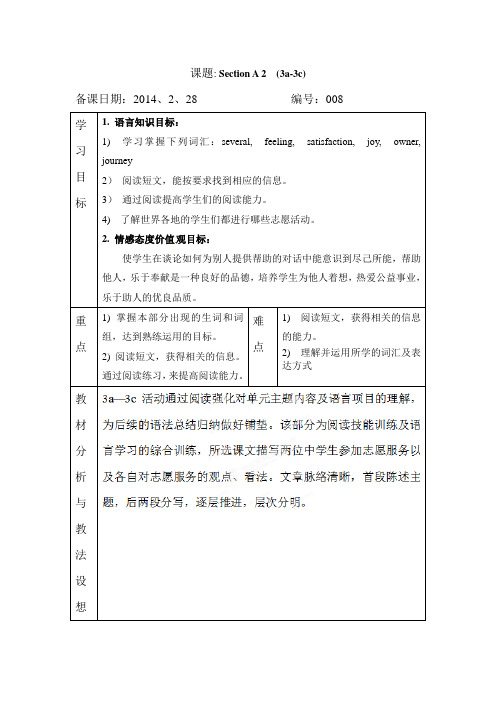
3. Mary decided ________ for a job at an after-school reading program last year. She still works there now _______ kids learn to read.
Ss try to answer the questions:
1. They volunteered to work at the old people’s home.
2. They ma de dumplings for the old people. They cleaned up their rooms. They talk ed with the old people. They sang and danced for the old people. …
B: Really? I did that last summer!
Step 2 New words
1. severalpron. adj.(=some)几个;数个;一些
e.g.There are several ways to find an apartment.找房子有几种方式。
2. feelingn.感触;感觉;感情;feel (v.) + ing feeling
Step 4Reading
1.3a:
1. Tell Ss to read the articl e in3aquickly and try to find the answers to these questions:
新版人教版八年级英语下册《Unit2 I’ll help to clean up the city

新版人教版八年级英语下册《Unit2 I’ll help to clean up the city parks》教学设计(第3课时)一. 教材分析人教版八年级英语下册《Unit2 I’ll help to clean up the city parks》是围绕环保主题展开的学习内容。
本节课主要通过讨论如何清理城市公园来提高学生的环保意识。
教材内容丰富,包括对话、阅读理解、语法和写作等,旨在培养学生的听、说、读、写综合语言运用能力。
二. 学情分析八年级的学生已经具备了一定的英语基础,对于日常生活中的话题能够进行简单的交流。
但部分学生在口语表达和写作方面还存在一定的困难,需要通过大量的练习来提高。
此外,学生对于环保主题的认识还不够深入,需要通过本节课的学习来提高环保意识。
三. 教学目标1.知识目标:–能够听懂、会说、会读本节课的重点单词和句型;–能够理解并运用本节课所学的语法知识;–能够阅读并理解与环保主题相关的短文。
2.能力目标:–能够用英语进行简单的环保话题交流;–能够写一篇关于环保的短文。
3.情感目标:–提高学生的环保意识,培养他们保护环境的习惯;–培养学生热爱生活、关注社会的情感。
四. 教学重难点•掌握本节课的重点单词和句型;•运用所学的语法知识进行环保话题的交流;•阅读并理解与环保主题相关的短文。
•运用所学的语法知识进行复杂的环保话题交流;•写一篇关于环保的短文。
五. 教学方法1.任务型教学法:通过设定各种环保相关的任务,让学生在完成任务的过程中学习和运用英语;2.情境教学法:创设各种环保情境,让学生在真实的环境中进行英语交流;3.合作学习法:引导学生进行小组合作,共同完成各种环保任务。
六. 教学准备2.多媒体设备;3.与环保主题相关的图片、视频等教学资源;4.练习题和测试题。
七. 教学过程1.导入(5分钟)利用图片或视频展示城市公园的美丽景象,引导学生谈论自己对城市公园的看法,激发学生的学习兴趣。
人教新目标八下教案:Unit 2 I’ll help to clean up the city park(Section B1 (1a-2e))

⑤ I’m only able to have a “dog-helper” because your kindness.
2.情感态度价值观目标:
了解社会上有很多人需要我们的帮助,奉献爱心并不是要有多么伟大的壮举,而是首先自己要真正拥有一颗“爱心”,如此便 可从身边的点点滴滴做起。
2. I took after my father.
3. I gave away my old clothes to the poor kid.
4. I ran out of my money last weekend.
5.I fix my bike and give it away.
Step 5 Listening
2. Play the recording for the Ss. Ss just listen for the first time. Play the recording again and number the pictures.
2.Talk about the dog-helper. What can it do?
e.g.A dog-helper can lead a blind man to many places. It can get the things a man wanted.
Step 3 Presentation
1.I’ve run out of it.
2.I take after my mother.
3.I fixed it up.
4. I gave it away.
a.I repaired it.
b.I don’t have any more
人教版新目标英语八年级下册《Unit 2 I’ll help to clean up the cit
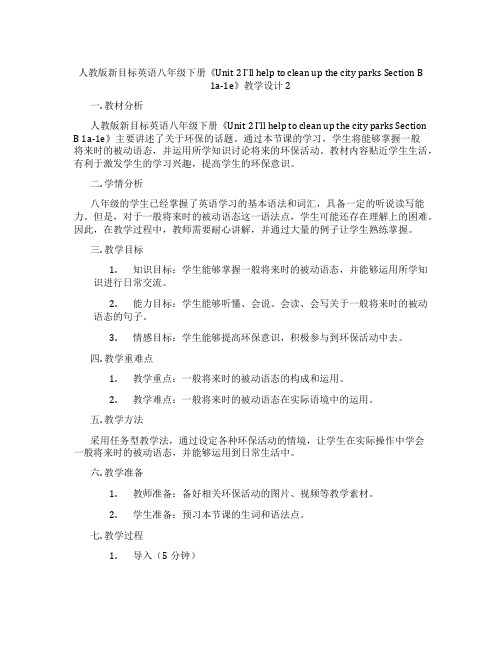
人教版新目标英语八年级下册《Unit 2 I’ll help to clean up the city parks Section B1a-1e》教学设计2一. 教材分析人教版新目标英语八年级下册《Unit 2 I’ll help to clean up the city parks Section B 1a-1e》主要讲述了关于环保的话题。
通过本节课的学习,学生将能够掌握一般将来时的被动语态,并运用所学知识讨论将来的环保活动。
教材内容贴近学生生活,有利于激发学生的学习兴趣,提高学生的环保意识。
二. 学情分析八年级的学生已经掌握了英语学习的基本语法和词汇,具备一定的听说读写能力。
但是,对于一般将来时的被动语态这一语法点,学生可能还存在理解上的困难。
因此,在教学过程中,教师需要耐心讲解,并通过大量的例子让学生熟练掌握。
三. 教学目标1.知识目标:学生能够掌握一般将来时的被动语态,并能够运用所学知识进行日常交流。
2.能力目标:学生能够听懂、会说、会读、会写关于一般将来时的被动语态的句子。
3.情感目标:学生能够提高环保意识,积极参与到环保活动中去。
四. 教学重难点1.教学重点:一般将来时的被动语态的构成和运用。
2.教学难点:一般将来时的被动语态在实际语境中的运用。
五. 教学方法采用任务型教学法,通过设定各种环保活动的情境,让学生在实际操作中学会一般将来时的被动语态,并能够运用到日常生活中。
六. 教学准备1.教师准备:备好相关环保活动的图片、视频等教学素材。
2.学生准备:预习本节课的生词和语法点。
七. 教学过程1.导入(5分钟)利用图片和视频展示环保活动的场景,引导学生谈论环保话题,激发学生的学习兴趣。
2.呈现(10分钟)教师展示一般将来时的被动语态的句子,让学生猜测其含义。
然后,教师给出一般将来时的被动语态的构成规则,并进行解释。
3.操练(15分钟)学生分组进行角色扮演,模拟环保活动的情境,运用一般将来时的被动语态进行对话。
人教新目标版英语八下Unit 2《I’ll help to clean up the city pa

人教新目标版英语八下Unit 2《I’ll help to clean up the city parks》(Period 4)教案一. 教材分析本课是人与自然主题下的城市生活内容。
通过描述志愿者清理城市公园的情景,引导学生关注城市环境,激发他们参与城市环保活动的兴趣。
教材内容丰富,语言贴近学生生活,有利于激发学生的学习兴趣和参与欲望。
二. 学情分析1.学生已经掌握了日常生活中的一些基本词汇和句型,如描述人物和地点的词汇、询问和回答地点的句型等。
2.学生已经具备了一定的听、说、读、写的能力,能够进行简单的交流和描述。
3.学生对环保主题有一定的认识,但对城市环保活动的了解不够深入。
4.学生普遍存在不敢开口说英语的现象,需要教师鼓励和引导。
三. 教学目标1.知识目标:–学会描述人物和地点的词汇和句型。
–学会询问和回答地点的句型。
–了解城市环保活动的意义,提高环保意识。
2.能力目标:–能够用英语进行简单的交流和描述。
–能够运用所学语言描述城市公园的环境和参与城市环保活动。
3.情感目标:–培养学生热爱大自然,关注城市环保的意识。
–鼓励学生积极参与社会公益活动,培养团队合作精神。
四. 教学重难点•描述人物和地点的词汇和句型。
•询问和回答地点的句型。
•运用所学语言描述城市公园的环境和参与城市环保活动。
•引导学生积极参与课堂活动,开口说英语。
五. 教学方法1.任务型教学法:通过设置具体任务,引导学生参与课堂活动,提高学生的实践能力。
2.情景教学法:创设真实情景,让学生在实际语境中学习英语,提高语言运用能力。
3.合作学习法:鼓励学生分组合作,培养团队合作精神和沟通能力。
六. 教学准备1.教学课件:制作课件,包括图片、视频等教学资源。
2.教学道具:准备相关的人物和地点的图片、卡片等道具。
3.教学场地:安排宽敞的教室,以便进行课堂活动。
七. 教学过程1.导入(5分钟)利用图片和视频展示城市公园的美丽景色,引导学生关注城市环境,激发他们对城市环保活动的兴趣。
新版人教版八年级英语下册《Unit2 I’ll help to clean up the city

新版人教版八年级英语下册《Unit2 I’ll help to clean up the city parks》教学设计(第4课时)一. 教材分析人教版八年级英语下册《Unit2 I’ll help to clean up the city parks》主要围绕着志愿者活动展开,让学生通过学习课文,了解志愿者活动的意义,并能够运用所学知识进行交际。
本节课是该单元的第四课时,主要学习第三、四段课文内容,以及相关语法知识点。
二. 学情分析八年级的学生已经具备了一定的英语基础,对于志愿者活动有一定的了解,但可能对于一些具体的语法知识点和词汇运用还不够熟练。
因此,在教学过程中,需要关注学生的个体差异,充分调动学生的积极性,引导他们通过自主学习、合作学习等方式,提高英语运用能力。
三. 教学目标1.知识目标:–能够理解并掌握课文第三、四段的内容;–能够熟练运用一般现在时进行交际;–能够正确使用情态动词can表示能力。
2.能力目标:–能够通过听、说、读、写的训练,提高英语运用能力;–能够通过小组合作,提高团队合作能力。
3.情感目标:–能够认识到志愿者活动的意义,激发参与志愿者活动的热情;–能够在日常生活中,积极承担责任,关爱社会。
四. 教学重难点1.教学重点:–课文第三、四段的内容;–一般现在时的运用;–情态动词can的用法。
2.教学难点:–一般现在时与现在进行时的区别;–情态动词can的否定句和疑问句的构成。
五. 教学方法1.任务型教学法:通过设置各种任务,让学生在完成任务的过程中,提高英语运用能力;2.合作学习法:通过小组合作,让学生互相交流、互相学习,提高团队合作能力;3.情境教学法:创设各种情境,让学生在真实的环境中,提高英语交际能力。
六. 教学准备1.教学课件:制作相关课件,帮助学生更好地理解课文内容;2.课文录音:准备课文录音,让学生听读课文,提高听力能力;3.练习题:准备相关练习题,巩固所学知识。
人教新目标八年级英语下册Unit 2 I’ll help to clean up the city parks Part A教案

Unit 2 part A 教案【教学目标】Knowledge objectiveGet the students to be able to know the new words and expressions they learnt in this partKey words: several, feeling, satisfaction, joy, owner, journey【教学重点】阅读短文,获得相关的信息。
通过阅读练习,来提高阅读能力。
【教学难点】理解并运用所学的词汇及表达方式【教学方法】PWP method, task-based method and interactive approach【教学手段】A tape recorder, multimedia and some pictures【教学过程】Teaching Procedures:Step 1 Warming upWatch a video and answer the questions.1. Where did they volunteer to work?2. What did they do there?3. What do you usually do on your free time? Would you like to volunteer to do anything for others?Ss try to answer the questions:1. They volunteered to work at the old people’s home.2. They made dumplings for the old people. They cleaned up their rooms. They talked with the old people. They sang and danced for the old people. …Step 2 Reading1. 3a:1. Tell Ss to read the article in 3a quickly and try to find the answers to these questions:(1)What does Mario love?(2)What does Mary love?(3)What do Mario and Mary volunteer to do?Ss read the article quickly and try to answer the questions:2. 方法指导:带着问题,然后快速阅读短文,争取在较短的时间内,找到答案。
人教新目标八下教案:Unit 2 I’ll help to clean up the city park(Section A Grammar focus-4c)
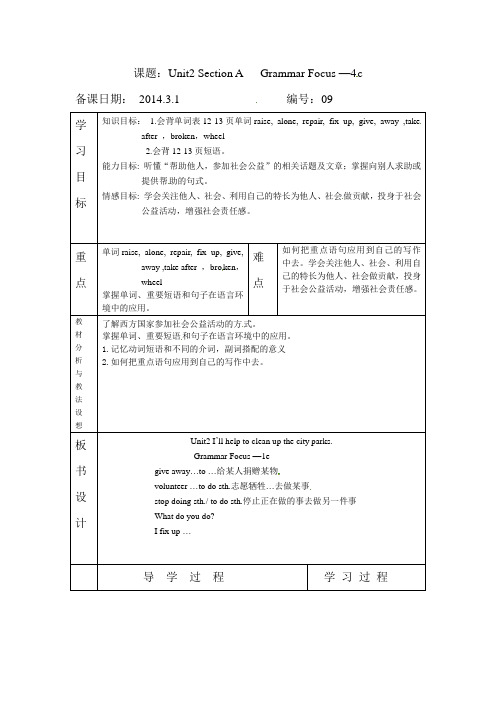
情感目标:学会关注他人、社会、利用自己的特长为他人、社会 做贡献,投身于社会公益活动,增强社会责任感。
重点
单词raise, alone, repair, fix up, give, away ,take after,bro ken,wheel
2.如何把重点语句应用到自己的写作中去。
板
书
设
计
Unit2 I’ll help to clean up the city parks.
Grammar Focus —1e
give away…to …给某人捐赠某物
volunteer …to do sth.志愿牺牲…去做某事
stop doing sth./ to do sth.停止正在做的事去做另一件事
教学札记
学生在造句时出现了一些汉语式的英语句子,要及时予以指点。加强练习。用好同步。
5)He always ________ out of his money before the end of the month...
6)Li Ming wrote the notice and I p____ it up.
7)My parents often _______ away some clothes to charity.
2. Learning the new knowledge
(1)根据音标拼读单词,然后两人一组检查拼读 情况。
(2)教师纠正发音不准的词并检查单词预习情况。
(3)课前提问:Grammar Focus,4a,4b和4c.
(6)听力:听录音排序完成1c。
听录音判断正误完成2a.。
人教版新目标版八年级英语下册Unit 2 I'll help to clean up the city parks Section B教案

《Unit 2 I'll help to clean up the city parks Section B》知能新视窗本节重要熟悉并运用上节课所学set up, cheer up, put off ,clean up等动词短语。
训练听力和阅读技能。
名师开小灶1.I take after my mother.我与我妈妈相像。
take after是短语动词,即“动词+介词”,意为“(在外貌、性格等方面)与……相像”。
如:The girl takes after her father, she has the same black hair,big eyes and quick temper.这女孩很像她父亲,她有着和父亲一样的黑头发、大眼睛和急性子。
He take after his father in mathematical ability.他有着和他父亲一样的数学才能。
2.I don’t have any more of it.我不再有它了。
句中not…any more意为“不再”(=no more)。
如:The tiger feels full now.It doesn’t eat any more.现在那只虎感觉吃饱了。
它不再吃了。
3.I fixed it up.我修理它。
在本句中,fix up 意为“修理”。
它还可以意为“解决;安顿,照应”。
如:He fixed up a dispute.他解决了争端。
We were fixed up for the night in a hotel.我们被安顿在招待所过夜。
st week everyone was trying to cheer up Jimmy the Bike Boy.上周大家都尽力使自行车男孩吉米振作起来。
本句是简单句,the Bike Boy作Jimmy的同位语。
cheer up 是短语动词,意为“使振作”。
try to do sth 意为“尽力做某事”。
新版人教版八年级英语下册《Unit2 I’ll help to clean up the city
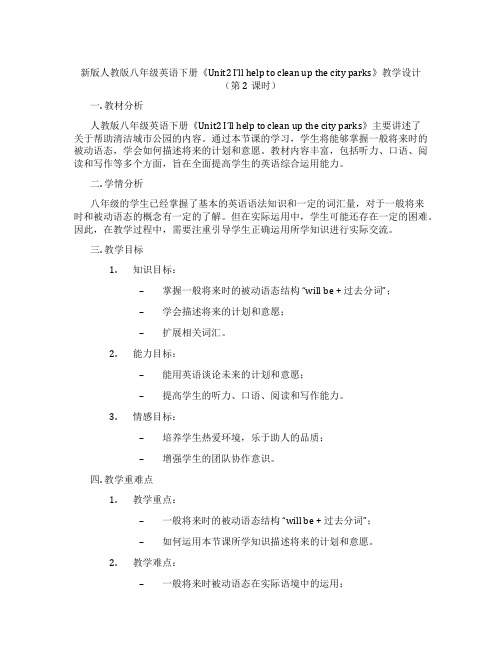
新版人教版八年级英语下册《Unit2 I’ll help to clean up the city parks》教学设计(第2课时)一. 教材分析人教版八年级英语下册《Unit2 I’ll help to clean up the city parks》主要讲述了关于帮助清洁城市公园的内容。
通过本节课的学习,学生将能够掌握一般将来时的被动语态,学会如何描述将来的计划和意愿。
教材内容丰富,包括听力、口语、阅读和写作等多个方面,旨在全面提高学生的英语综合运用能力。
二. 学情分析八年级的学生已经掌握了基本的英语语法知识和一定的词汇量,对于一般将来时和被动语态的概念有一定的了解。
但在实际运用中,学生可能还存在一定的困难。
因此,在教学过程中,需要注重引导学生正确运用所学知识进行实际交流。
三. 教学目标1.知识目标:–掌握一般将来时的被动语态结构“will be + 过去分词”;–学会描述将来的计划和意愿;–扩展相关词汇。
2.能力目标:–能用英语谈论未来的计划和意愿;–提高学生的听力、口语、阅读和写作能力。
3.情感目标:–培养学生热爱环境,乐于助人的品质;–增强学生的团队协作意识。
四. 教学重难点1.教学重点:–一般将来时的被动语态结构“will be + 过去分词”;–如何运用本节课所学知识描述将来的计划和意愿。
2.教学难点:–一般将来时被动语态在实际语境中的运用;–拓展词汇的运用。
五. 教学方法1.任务型教学法:通过设定各种实际任务,让学生在完成任务的过程中运用所学知识,提高实际运用能力。
2.情境教学法:创设各种生活情境,引导学生模仿、实践,增强语言的真实感。
3.互动式教学法:鼓励学生积极参与课堂活动,进行师生互动、生生互动,提高课堂氛围。
六. 教学准备2.教学课件;3.相关图片、视频等教学资源;4.录音设备。
七. 教学过程1.导入(5分钟)–教师通过提问引导学生谈论自己的周末计划,引出一般将来时。
–学生听录音,模仿对话。
人教新目标版八年级英语下册教案:Unit 2 I'll help to clean up the c

Unit 2I'll help to clean up the city parks.Language Goals【语言目标】Learn to offer help. Knowledge Goals【知识目标】Key Wordsvolunteer,notice,lonely,several,feeling,satisfaction,owner,journey,raise,alone,repair,fix,wheel,letter,Miss,blind,deaf,imagine,difficulty,open,door,carry,train,excited,kindness,clever,understand,change,disabled,strong,sir,madamKey Phrases clean up,cheer up,give out,used to,fix up,give away,set up,make adifference,take afterKey Sentences1.The girl could visit the sick kids in thehospital to cheer them up. 2.The boy could give out food at the foodbank.3.We need to come up with a plan for the City Park CleanUp Day.4.He used to do homework in theevening.5.I want to learn more about how to carefor animals.6.I gave away my bike to a children'shome.7.I'm sure you know that this group was set up to help disabled people like me. 8.Lucky makes a big difference to mylife.Key Grammar Learn to offer help and learn phrasal verbs(verbs+adv.)Ability Goals 【能力目标】1.Be able to offer help. 2.Enable the students to write a letter about what they want to volunteer to do.Moral Goals 【情感目标】1.Let the students know how to offer help. 2.It is important for them to help others.Teaching Time【课时】Four periods Period 1 Section A(1a~2d)Period 2 Section A(3a~4c)Period 3 Section B(1a~1e)Period 4 Section B(2a~Self Check)第1课时 Section A (1a ~2d )类别 课时要点重点单词cheer(v .)欢呼;喝彩volunteer(v . & n .)义务做;自愿做;志愿者notice(n .)公告牌;通告 lonely(adj .)孤独的;寂寞的 重点词组clean up 打扫或(清除)干净 cheer up(使)变得高兴;振奋起来give out 分发;散发 used to 曾经……;过去……make a plan 制定计划care for 照顾重点句式You could help to clean up the city parks.你可以帮助打扫城市公园。
人教新目标八下教案:Unit_2_I’ll_help_to_clean_up_the_city_pa

课题:Unit 2 Section A 3 Grammar focus-4c备课日期:2014、2、26 编号:009 学习目标重点1) 复习巩固Section A 部分所学的生词和词组,达到熟练运用的目标。
2) 掌握和运用动词不定式的用法。
难点1) 掌握学过的后面跟不定式做宾语的动词。
2) 掌握动词不定式作不同的句子成份。
教材分析与教法设kids and cheer them up.③他自愿一周去那里一次去帮助孩子们学习读书She ________ there once a week ____ ______ kids learn to read.④他决定参加一个志愿者课后阅读节目的选拔。
She _______ ______ try out for a volunteerafter-school reading program.⑤马里奥相信这会帮助他获得他的梦想工作。
Mario b elieves it can help him _____ _____ his future dream job.⑥我正在制作一些告示,并将它们张贴于学校里。
I’m making som e sings _____ _____ _____ around the school.Step 3 动词不定式用法小结:1. 做动词宾语。
常见动词有would like, want, help, learn, hope, decide, volunteer。
e.g. We don’t want to spent too much money.我们不想花费太多钱。
2. 作宾语补足语。
常见动词有ask, want, tell, invite, like, hate。
e.g. Mr. Li asked the students to copy the text. 李老师让学生们抄写课文。
3. 作目的状语。
e.g. Jack turned his head around to look at people. 杰克转过头看向人群。
Unit2 I'll help to clean up the..教学设计 人教新目标八年级英语下册
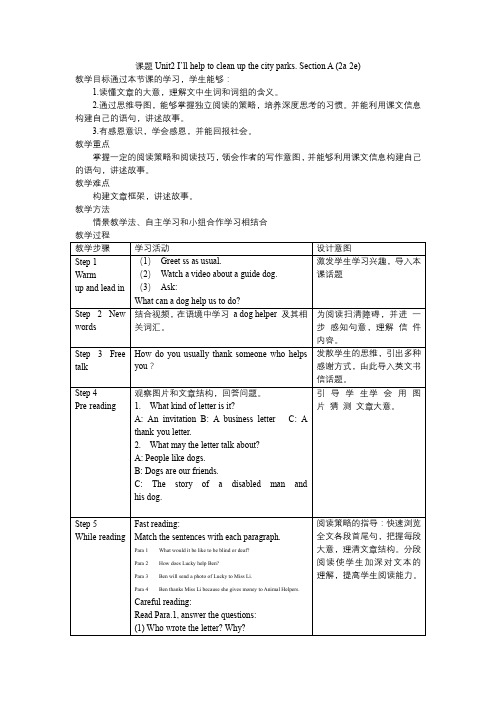
课题Unit2 I’ll help to clean up the city parks. Section A (2a-2e)
教学目标通过本节课的学习,学生能够:
1.读懂文章的大意,理解文中生词和词组的含义。
2.通过思维导图,能够掌握独立阅读的策略,培养深度思考的习惯。
并能利用课文信息构建自己的语句,讲述故事。
3.有感恩意识,学会感恩,并能回报社会。
教学重点
掌握一定的阅读策略和阅读技巧,领会作者的写作意图,并能够利用课文信息构建自己的语句,讲述故事。
教学难点
构建文章框架,讲述故事。
教学方法
情景教学法、自主学习和小组合作学习相结合。
新人教版英语八年级下册教案《Unit 2 I’ll help to clean up the city parks》(第1课时)教案

《Unit 2 I’ll help to clean up the city parks》(第1课时)一、教学目标:1. 语言知识目标:掌握本单元重要词汇与句型。
2. 过程与方法:听说读写训练,通过自主学习,小组合作探究等多种方式充分调动学生的学习积极性。
3. 情感态度价值观目标:在授课过程中渗透助人就是助己,助人收获快乐的情感目标,使学生在谈论如何为别人提供帮助的对话中能意识到尽己所能,帮助他人,乐于奉献是一种良好的品德,培养学生为他人着想,热爱公益事业,乐于助人的优良品质。
二、教材分析通过讨论“志愿者”及“志愿活动”的话题,学习动词词组、不定式充当宾语、状语和宾语补足语的用法、使用情态动词could给别人提供建议。
教学重点:1) 掌握这些短语动词的构成和用法:clean up, cheer, cheer up, give out, volunteer, notice, used to, lonely 2) 学会提供帮助的基本句型:I’d like to work outside. I’ll help clean the city park. You could give out food at a food bank 3)不定式机构在句中担当成分和用法。
教学难点:不定式机构在句中担当成分和用法。
三、学情分析通过初中一年半的英语学习,大多数学生已能听懂有关熟悉话题的语段和简短的故事,能就熟悉的话题交换信息,能读懂短篇故事,能写便条和简单的书信。
但由于各种因素的影响,学生发展参差不齐。
少数学生因为基础不够好,学习很吃力而自暴自弃,学生两级分化严重,每节授课内容不宜过多,用多种教学手段充分调动学生的学习兴趣。
四、教学手段:多媒体辅助课题三维教学目标知识与技能:1、词汇:cheer, volunteer, sign, notice, lonely2、短语:clean up, cheer up, give out, come up with, put off, hand out, call up, used to3、句型:You could help to clean up the city parks.We should listen to them and care for them.方法与过程:学生带着任务自主学习,合作探究,教师引导,学生总结展示知识点,记笔记。
人教新目标八年级英语下册Unit 2 I'll help to clean up the city park教案

Unit 2 I’ll help to clean up the city park s.Section A 1 (1a-2d)一、教学目标:1. 语言知识目标:1) 能掌握以下单词:clean up,city,cheer,cheer up,give out,volunteer,notice,used to,lonely,能掌握以下句型:① You could help to clean up the city parks.② We should listen to them and care for them.2) 能了解以下语法:情态动词could,should的用法;用should或could提出建议并对别人的建议作出评价。
如何表达主动提供帮助。
2. 情感态度价值观目标:在授课过程中渗透助人就是助己,助人收获快乐的情感目标,使学生在谈论如何为别人提供帮助的对话中能意识到尽己所能,帮助他人,乐于奉献是一种良好的品德,培养学生为他人着想,热爱公益事业,乐于助人的优良品质。
二、教学重难点1. 教学重点:1) 掌握这些短语动词的构成和用法:clean up,city,cheer,cheer up,give out,volunteer,notice,used to,lonely2) 学会提供帮助的基本句型:I’d like to work outside.I’ll help clean the city park.You could give out food at a food bank.2. 教学难点:学会提供帮助的基本句型三、教学过程Step 1 New words1. notice n. 公告牌;通告;布告e.g. Please read the list on the notice board. 请读公告板上的名单。
2. sign n.标志;信号e.g. Look around,we could see no sign of life.环顾四围,我们看不出一点生命的迹象。
英语教案人教版新目标八年级英语下册 Unit 2 I'll help to clean up...

Unit 2 I'll help to clean up the city parksLevel: 8th gradeObjectives:By the end of this unit, students will be able to:Understand and use vocabulary related to environmental issues.Discuss the importance of protecting the environment and taking action to address environmental problems.Write persuasive essays advocating for environmental protection.Materials:Textbook: “New Target 8 English”from People's Education PressWhiteboard and markersHandouts with environmental vocabularyVideo or images related to environmental problems and solutionsWriting prompts for persuasive essaysProcedure:Introduction: Begin the lesson by asking students about their thoughts on the environment and how they think they can protect it. Write some of their responses on the board.Vocabulary: Introduce vocabulary related to environmental issues, using flashcards and pictures to help students understand and remember the words. Examples of vocabulary to cover include "pollution," "recycling," "conservation," "global warming," "deforestation," "fossil fuels," "sustainability," "clean energy," "plastic waste," and "carbon footprint."Listening:Play a video or show images related to environmental problems and solutions, and have students listen and watch to identify the issues and proposed solutions. Ask comprehension questions to ensure they understand what they saw.Speaking:Divide students into pairs and have them discuss the importance of protecting the environment and what they can do to address environmental problems. Encourage them to share their opinions and ideas for taking action.Reading: Distribute handouts with environmental vocabulary and have students read and define the words. Ask comprehension questions to ensure they understand what they read.Writing:Provide students with writing prompts for persuasive essays advocating for environmental protection, such as "Why is it important to protect the environment?" or "What can we do to address environmental problems?" Encourage them to use proper grammar and sentence structures.Review:Review the vocabulary and concepts covered in the lesson, and ask students to share what they have learned. Play a game or do a fun activity to reinforce the material.Extension: Assign students to conduct research on a specific environmental issue, such as plastic waste or air pollution, and present their findings to the class. Encourage them to propose solutions and ways to take action to address the issue.Assessment:Assess student understanding of the material by observing their participation in class discussions and activities, listening to their speaking and reading, and reading their written essays. Offer feedback and corrections as needed, and provide additional practice if necessary.。
- 1、下载文档前请自行甄别文档内容的完整性,平台不提供额外的编辑、内容补充、找答案等附加服务。
- 2、"仅部分预览"的文档,不可在线预览部分如存在完整性等问题,可反馈申请退款(可完整预览的文档不适用该条件!)。
- 3、如文档侵犯您的权益,请联系客服反馈,我们会尽快为您处理(人工客服工作时间:9:00-18:30)。
5 . Let some Ss read their letters and correct them.
Step 5 Self Check
Work on Self Check 1:
1. Fill in each blank with a possible verb to make a phras al verb.
e.g.
Working in an old people’s home
Helping kids in an after-school program
Being a guide at a museum
Talk with your partner about what kinds of volunteer work you would do.
2. Ss work and by themselves and try to fill in the blanks.
4. Check the answers with the class.
Step 6 Exercises
If time is enough, do some more exercises on big screen.
3)复习总结动词不定式的用法,并能完成相关练习题。
难
点
教材
分析
与教
法设
想
本节课重在复习巩固Section B的内容。学会运用所学语言进行书面表达。3b中的写作任务有问题提示,学生写起来比较容易些。可叫学生当堂写作 ,互批互改。教师和同学们一起批改一份作业师范。
板
书
设
计
教
学
过
程
导学过程
学习过程
Step 1 Revision
Ss try to write down their answers and write a short letter by th emselves.
Read the short passage and fill in the blanks with the appropriate phrasal verbs or infinitives.
课题:Unit 2Section B (3a-Self check)
备课日期:2 014.3.4编号:011
学习
目标
1.语言知识目标:
1)复习动词不 定式的不同用法。掌握生词strong, sir, madam。
2)能够用英语表述常见的志愿活动,并就自己喜欢的志愿活动发表看法。
3)能用本单元所学的语言简单表达对自己所喜欢的志愿活动的一些看法。
2.情感态度价值观目标:
了解社会上有很多人需要我们的帮助,奉献爱心并不是要有多么伟大的壮举,而是首先自己要真正拥有一颗“爱心”,如此便可从身边的点点滴滴做起。明确自己所喜欢的志愿活动,并知道自己能为他人做些什么事情。
重
点
1)能运用所学的语言知识来简单地表达自己想做什么样的志愿活动。
2)总结本单元学到的重点词组及句型。
Fill in the blanks with the proper words.
Check the answers with the Ss.
Step 2
3a. Look at these kinds of volunteer work. Can you add more? What would you like to do? Discuss it with a partner.
Step 3 Ask and answer
What would you 来自ike to do?Why do you l ike to do that?
Step 4 Writing
Work on 3b:
1. Let one student write his or her answer to the questions.
2. Fill in the blanks a nd try to say the meaning of it.
3. Make a new sentence with each phrase.
Work on Self check 2
1. Tell Ss should try to read the short article first and try to know the main meaning. Then read carefully and try to understand the meaning of each blanks.
Ben Smith is a ___________ man. He has man y __ ________ in his life. He can’t _____ his _____ or legs well. Some normal things like answering the telephone, ________ and closing the doors, or ________ things are difficult for him. But “Lucky”, the dog-helper, makes ________ to his life. Lucky is a fantastic dog. It’s very ______ and __________ many English words. It can understand him when he gives him order.
Homework
Finish the letter or e-mail in 3b, using the useful sentences.
教学札记
每单元的复习巩固课可引导学生独立完成,教师只做精要点拨。
